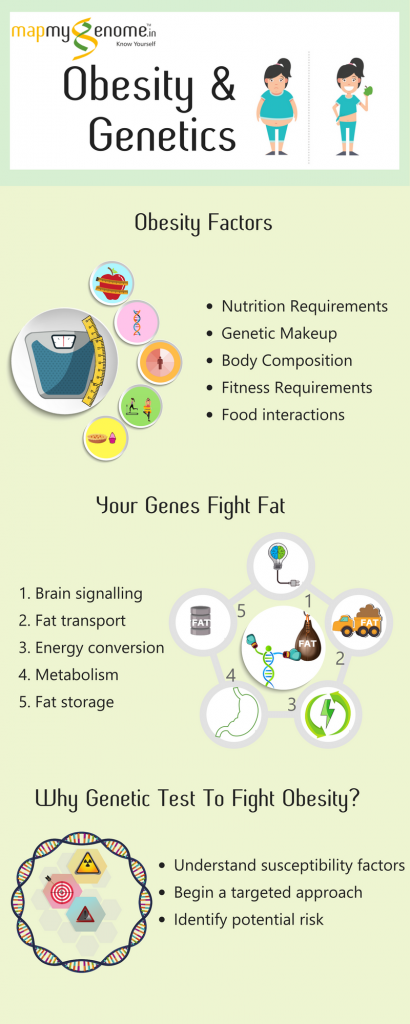Obesity: Your Genes Are More Responsible Than You Think
Jul 13, 2017
34811 Views
Obesity is more than just having an elevated BMI/excess weight. Chronic obesity can present as one of the features of certain inherited conditions, erratic hormones and other underlying changes, at the cellular level. Given its complex nature, this trait can dynamically change, when exposed to genetic and non-genetic factors. A multidimensional approach may help in controlling obesity better, instead of solely focusing on weight loss.
Diet (what you eat) and exercise (how much physical activity you engage in) are well-known factors which affect Body Mass Index (BMI) and obesity. However, if you wish to understand how BMI affects your overall health, a more holistic view of other elements like body composition (lean versus fat mass), food interactions within your system, nutrition requirements (as per current lifestyle) and genetic makeup is essential.
A classic example of how phenotypic (physical character) variations exist in people: A regular jogger who watches what he/she eats is heavier, has a greater BMI than someone who eats out thrice a week, has a desk job and does not exercise. We all have those thin friends who never need to watch their weight and can eat like there’s no tomorrow. Do not blame them… it could be in their genes.
Genes execute functions related to fat tissue metabolism, excess fat storage, transport, brain signalling (for those moments when you feel you can eat everything in sight!) and energy conversion. The two most important genetic determinants are the Fat and Obesity-associated gene (FTO) and Melanocortin receptor-4 (MC4R). Be it American, European, African or Indian, there are common variations found in their codes that increase obesity risk and therefore, risk for metabolic disorders, diabetes, etc. An individual who carries such variants has a higher predisposition for excess fat, by causing uncontrolled hunger pangs, lesser satiety after meals and irregular appetite. The MC4R protein is present in the hypothalamus of your brain. When a genetic defect reduces the amount of this protein, you may feel excessively hungry (as energy levels are miscalculated by the brain) and eat food in larger quantities. This directly results in obesity. One such variant has been reported in at least 22% of the general population.
How genetic information can help you stay fit
- Understand susceptibility factors such as weight regain, reduced sensitivity to high-fat foods, lack of controlled eating, etc.
- Begin a targeted approach to delay or mitigate obesity, through a combination of optimal exercise and a genetically-tailored diet.
- Identify potential risk such as inheritance patterns (family history), associated traits such as insulin resistance, muscle/bone architecture and micronutrient levels (vitamins), and thereby stick to a sustainable action plan, for life.
A smart person will probably lose weight, and keep it off for years, without going on a crash diet or killing hours in the gymnasium. This is possible through a combination of the right nutrients in daily meals, consistent workout programs, which torch calories and retain lean muscle, consciousness of metabolic requirements for their own body and scientific know-how as well. A little bit of gyan a day will help keep obesity and other evils away!

Mapmygenome can help you achieve your weight goals
At Mapmygenome, we can tell you about the diet pattern that works for you. Understanding your appetite, metabolism, fat storage capacity, and other relevant factors can help you make a long-term switch towards a healthy diet. It works like this:
- Our Genomepatri Fit test analyzes your diet and physiology at the DNA level.
- Our genetic counsellors then correlate these findings with health history and recommend action plans for a healthier life.
- Nutrition counsellors give you personalized diet advice and plans based on your DNA and genetic counsellors’ recommendations.


